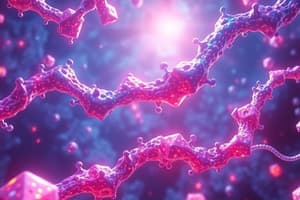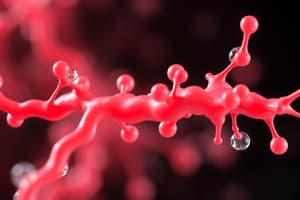Podcast
Questions and Answers
What is the primary function of liver glycogen?
What is the primary function of liver glycogen?
- Support ATP synthesis during muscle contraction
- Maintain blood glucose concentration (correct)
- Provide glucose for cellular respiration
- Store energy for anaerobic respiration
Which enzyme is responsible for forming α(1→4) linkages during glycogen synthesis?
Which enzyme is responsible for forming α(1→4) linkages during glycogen synthesis?
- Glycogen synthase (correct)
- Debranching enzyme
- Amylo-α(1→6)-transglucosidase
- Glycogen phosphorylase
What is the role of the branching enzyme in glycogen metabolism?
What is the role of the branching enzyme in glycogen metabolism?
- Converts glucose-1-phosphate to glucose-6-phosphate
- Creates branches in glycogen (correct)
- Cleaves α(1→6) glycosidic bonds
- Hydrolyzes glucose molecules
Which process describes the breakdown of glycogen to glucose-1-phosphate?
Which process describes the breakdown of glycogen to glucose-1-phosphate?
What role does phosphoglucomutase play in glycogen degradation?
What role does phosphoglucomutase play in glycogen degradation?
What is the primary function of glucose-6-phosphatase in the liver?
What is the primary function of glucose-6-phosphatase in the liver?
What occurs in skeletal muscle tissue when oxygen demand is high during exercise?
What occurs in skeletal muscle tissue when oxygen demand is high during exercise?
Which hormone inhibits glycogen synthase and activates glycogen phosphorylase?
Which hormone inhibits glycogen synthase and activates glycogen phosphorylase?
What is a characteristic symptom of Glycogen Storage Disease Type-I (Von Gierke’s disease)?
What is a characteristic symptom of Glycogen Storage Disease Type-I (Von Gierke’s disease)?
What happens to glycogen metabolism when the body is well fed?
What happens to glycogen metabolism when the body is well fed?
Flashcards
Muscle Glycogen Function
Muscle Glycogen Function
Provides fuel (ATP) for muscle contraction.
Liver Glycogen Function
Liver Glycogen Function
Maintains blood glucose levels, especially during fasting.
Glycogenesis
Glycogenesis
The process of glycogen synthesis from glucose.
Glycogenolysis
Glycogenolysis
Signup and view all the flashcards
Glycogen Synthase
Glycogen Synthase
Signup and view all the flashcards
Branching Enzyme
Branching Enzyme
Signup and view all the flashcards
Glycogen Phosphorylase
Glycogen Phosphorylase
Signup and view all the flashcards
Debranching Enzyme
Debranching Enzyme
Signup and view all the flashcards
Liver Glycogen Amount
Liver Glycogen Amount
Signup and view all the flashcards
Muscle Glycogen Amount
Muscle Glycogen Amount
Signup and view all the flashcards
Glucose-6-phosphate in liver
Glucose-6-phosphate in liver
Signup and view all the flashcards
Glucose-6-phosphate in muscle
Glucose-6-phosphate in muscle
Signup and view all the flashcards
Glycogen degradation (lysosomal)
Glycogen degradation (lysosomal)
Signup and view all the flashcards
Glycogen synthesis and degradation regulation (liver)
Glycogen synthesis and degradation regulation (liver)
Signup and view all the flashcards
Glycogen synthesis and degradation regulation (muscle)
Glycogen synthesis and degradation regulation (muscle)
Signup and view all the flashcards
Hormonal regulation of glycogen
Hormonal regulation of glycogen
Signup and view all the flashcards
Glycogen Storage Disease Type 1 (Von Gierke's)
Glycogen Storage Disease Type 1 (Von Gierke's)
Signup and view all the flashcards
Study Notes
Glycogen Metabolism
- The body stores glycogen primarily in the liver and muscle.
- Muscle glycogen provides energy for ATP synthesis during muscle contraction.
- Liver glycogen maintains blood glucose levels, especially during fasting.
- The total glycogen in the body is roughly 400 grams, with 1-2% of the resting muscle weight and about 10% of the well-fed adult liver's fresh weight comprised of glycogen.
- Glycogen is a branched polysaccharide consisting of glucose units.
- Glycogenesis: The synthesis of glycogen from glucose, primarily in the liver. It requires energy (ATP) and specific enzymes.
- A critical enzyme in glycogen synthesis is glycogen synthase.
Glycogenesis
- Glycogen synthase is responsible for forming the a(1→4) glycosidic linkages.
- Branching enzyme (amylo-(1,4 → 1,6)-transglucosidase) creates a(1→6) linkages to branch the glycogen molecule.
- Glycogenesis takes place in the cytosol.
Glycogenolysis
- Glycogenolysis, the breakdown of glycogen, is triggered when needed.
- Glycogen phosphorylase is the enzyme breaking down a(1→4) glycosidic bonds at the non-reducing ends of the glycogen molecule.
- This process produces glucose-1-phosphate.
- A glucosyl residue is removed from each nonreducing end.
- The branching points are removed by two debranching enzymes (a(1→4)-glucan transferase and amylo-a(1→6)-glucosidase) for complete breakdown.
Conversion of Glucose-1-Phosphate
- Glucose-1-phosphate is converted into glucose-6-phosphate by phosphoglucomutase, in the liver or muscles.
Hormonal Regulation
- Glucagon and epinephrine stimulate glycogenolysis & hinder glycogenesis during low blood sugar.
- Insulin triggers glycogenesis & hinders glycogenolysis and keeps blood sugar normal during high blood sugar.
- In muscles, glucagon doesn't have a role in glycogen metabolism.
Glycogen Storage Diseases
- Type I glycogen storage disease is also known as Von Gierke's disease.
- A deficiency in glucose-6-phosphatase causes this disease, leading to excessive glycogen buildup in the liver and difficulty in releasing glucose into the bloodstream.
- This can cause liver enlargement (cirrhosis), and children with this condition often experience early death.
- Treatment consists of frequent small food servings.
Lecture Objectives
- Differentiate between liver and muscle glycogen function.
- Describe glycogenesis and glycogenolysis.
- Explain the hormonal regulation of glycogen metabolism.
- Define the cause of type I and II glycogen storage disease.
Studying That Suits You
Use AI to generate personalized quizzes and flashcards to suit your learning preferences.



